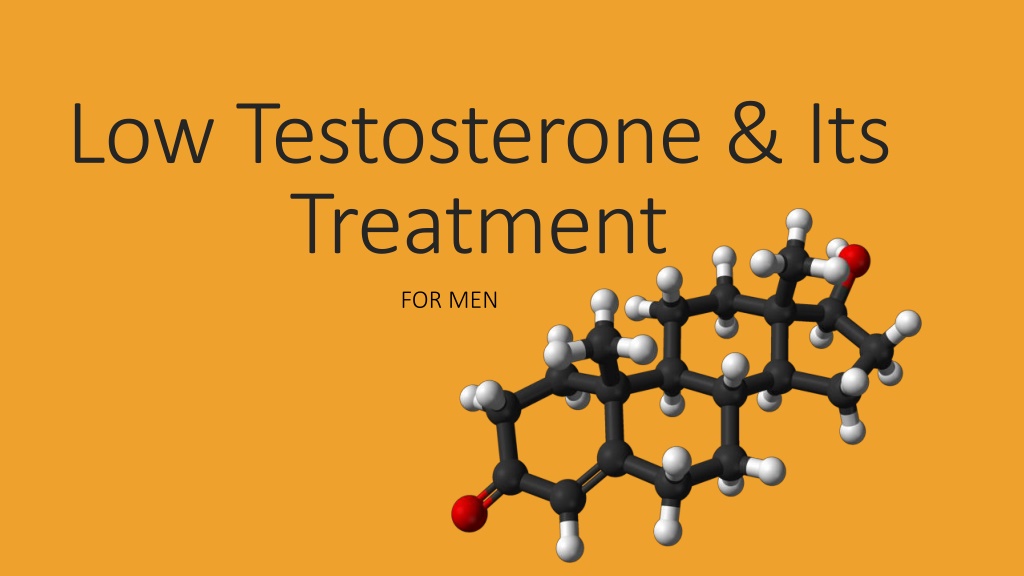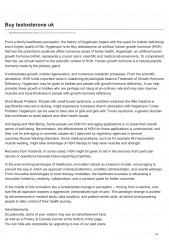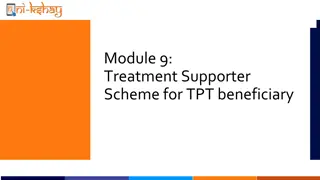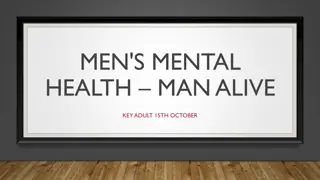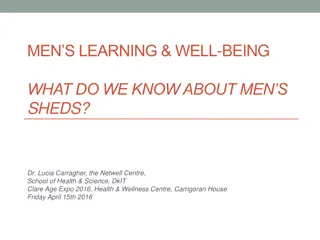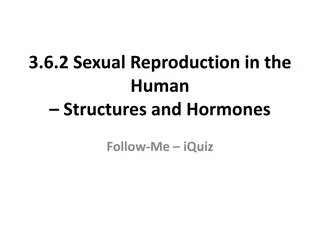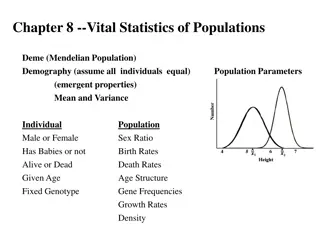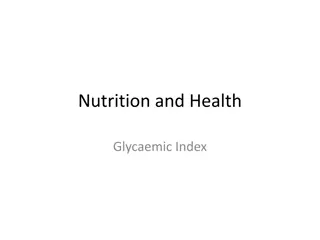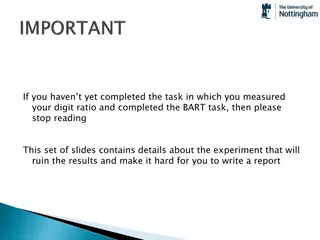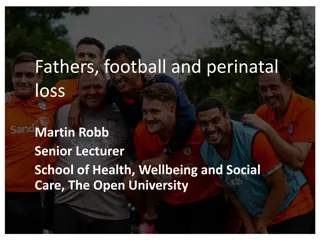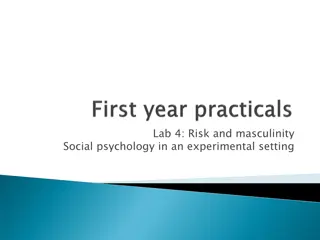Understanding Low Testosterone Levels and Treatment Options for Men
Testosterone is a vital steroid hormone that plays a key role in the development of male characteristics. Low testosterone levels can lead to various health effects, including decreased muscle mass, bone density, and libido. Testosterone replacement therapy (TRT) is commonly used to treat males with hypogonadism. Aging is a natural factor that can contribute to declining testosterone levels. Maintaining optimal testosterone levels can offer benefits like a healthy heart, increased muscle mass, stronger bones, and improved libido.
Download Presentation

Please find below an Image/Link to download the presentation.
The content on the website is provided AS IS for your information and personal use only. It may not be sold, licensed, or shared on other websites without obtaining consent from the author. Download presentation by click this link. If you encounter any issues during the download, it is possible that the publisher has removed the file from their server.
E N D
Presentation Transcript
Low Testosterone & Its Treatment FOR MEN
What is Testosterone? Steroid hormone from the androgen group Stimulates development of male secondary sexual characteristics, produced mainly in the testes, but also in the ovaries and adrenal cortex. - Wikipedia
Health effects Anabolic effects: Anabolic effects: Androgenic effects: Androgenic effects: Muscle mass and strength Increased bone density and strength Stimulation of linear growth Bone maturation. etc. Maturation of the sex organs Deepening of the voice, etc
Benefits of Testosterone 1 1. . Healthy Healthy Heart Heart and and Blood Blood A healthy heart pumps blood to the rest of the body, providing muscles and organs with the oxygen needed for peak performance.
Benefits of Testosterone 2. Less Fat, More 2. Less Fat, More Muscle Muscle Leaner body mass helps control weight and increases energy.
Benefits of Testosterone 3. Stronger Bones 3. Stronger Bones Strong bones help support your muscles and internal organs, which can boost athletic performance.
Benefits of Testosterone 4. Better Libido 4. Better Libido Testosterone levels naturally rise in response to sexual arousal and activity.
Medical uses The primary use of testosterone is the treatment of males with too little or no natural testosterone production males with hypogonadism. Known as hormone replacement therapy or testosterone replacement therapy (TRT).
Low levels due to aging Testosterone levels decline gradually with age
Insufficiency Testosterone insufficiency (also termed hypotestosteronism or hypotestosteronemia) is an abnormally low testosterone production. It may occur because of : Testicular dysfunction (primary hypogonadism) Or Hypothalamic-pituitary dysfunction (secondary hypogonadism)
Warning Signs or Symptoms of Low Testosterone Muscle Tissue (Loss) Brain Function (Decreased) Heart (Weakened) Fat (Increase) Drowsiness Moodiness Diminished Libido
Symptoms of Hypogonadism Male hypogonadism can occur at any age, as a result of problems affecting the testicles or the pituitary gland.
Signs of hypogonadism in infants include: Ambiguous genitalia Female genitalia (in a genetically male child) Underdeveloped male genitalia
In boys, symptoms of hypogonadism include: Lack of development of muscle mass No deepening of the voice or growth of body hair Slow increase in size of penis or testicles Arms and legs that grow out of proportion to the rest of the body
In adult men, symptoms of hypogonadism include: Lack of fertility Low sex drive Erectile dysfunction Sparse facial or body hair Growth of breast tissue
Symptoms of Age-Related Testosterone Decline Fatigue Weakness Depression Sleep disturbances
Low Testosterone Levels Low testosterone levels, or "low T," can be caused by a wide variety of medical conditions or by the use of some drugs. After age 30, most men experience a gradual drop in testosterone.
Causes of Low Testosterone Autoimmune diseases Chronic liver or kidney disease Chronic obstructive lung disease Genetic causes Heart failure HIV/AIDS
Causes of Low Testosterone Infections (such as mumps) Injury to the testicles Metabolic disorders Obesity
Causes of Low Testosterone Prolactinoma (prolactin-secreting tumor) in the pituitary gland Testicular cancer or treatment for testicular cancer Type 2 diabetes
Drugs associated with low testosterone levels Alcohol Chemotherapy drugs used to treat cancer Corticosteroids (sometimes called glucocorticoids) Opioids
Low T Diagnosis Hypogonadism and age-related low testosterone are diagnosed with blood tests blood tests that measure the level of testosterone in the body.
Low T Diagnosis Testosterone levels can vary from day to day, and by time of day, so at least two blood tests are needed to confirm a hypogonadism diagnosis. The first blood test will give your doctor a baseline. The second test confirms your levels and helps confirm a diagnosis.
Low T Diagnosis There are two types of blood tests that can be done to measure your testosterone. The most common test measures the total testosterone in your body. Your doctor may also order a free testosterone test as well as additional tests to help confirm a diagnosis.
Low T Diagnosis Since testosterone levels are at their peak in the morning, it's recommended that blood tests are performed in the morning.
Is Low Testosterone Dangerous to Your Health? A lack of testosterone can sometimes have long-term, serious effects on the body. In men with very low levels, the bones can become weak, potentially causing a condition called osteoporosis. Osteoporosis makes people considerably more prone to injury. One study in the Journal of Clinical Endocrinology and Metabolism also linked low testosterone to a higher risk of death from heart disease and other causes.
Treatment of Low Testosterone The best treatment for "low T" depends on its cause. Sometimes testosterone replacement therapy is needed; other times, weight loss weight loss is the best medicine.
Low T Treatment Options Skin Gel Patches Shots Tablets Testosterone injections
Considering Testosterone Replacement Therapy? Testosterone replacement therapy can be beneficial for men with low testosterone levels. Doctors and researchers have varying opinions regarding effectiveness. .
Considering Testosterone Replacement Therapy? The experts at the Mayo Mayo Clinic Clinic say that study results are mixed. For maximum effectiveness, maintain a healthy diet and exercise regularly. Don t purchase testosterone without a prescription. Follow-up care and monitoring is recommended.
How to Boost Testosterone Naturally Get a Good Night s Sleep Lose That Excess Weight Go Easy on the Sugar (Less Sugar) Maintain a healthful diet Get regular exercise Limit alcohol
Bottom Line Patients with severe heart disease, liver disease or kidney disease should not use any kind of testosterone replacement therapy except under close medical supervision. Thank You
